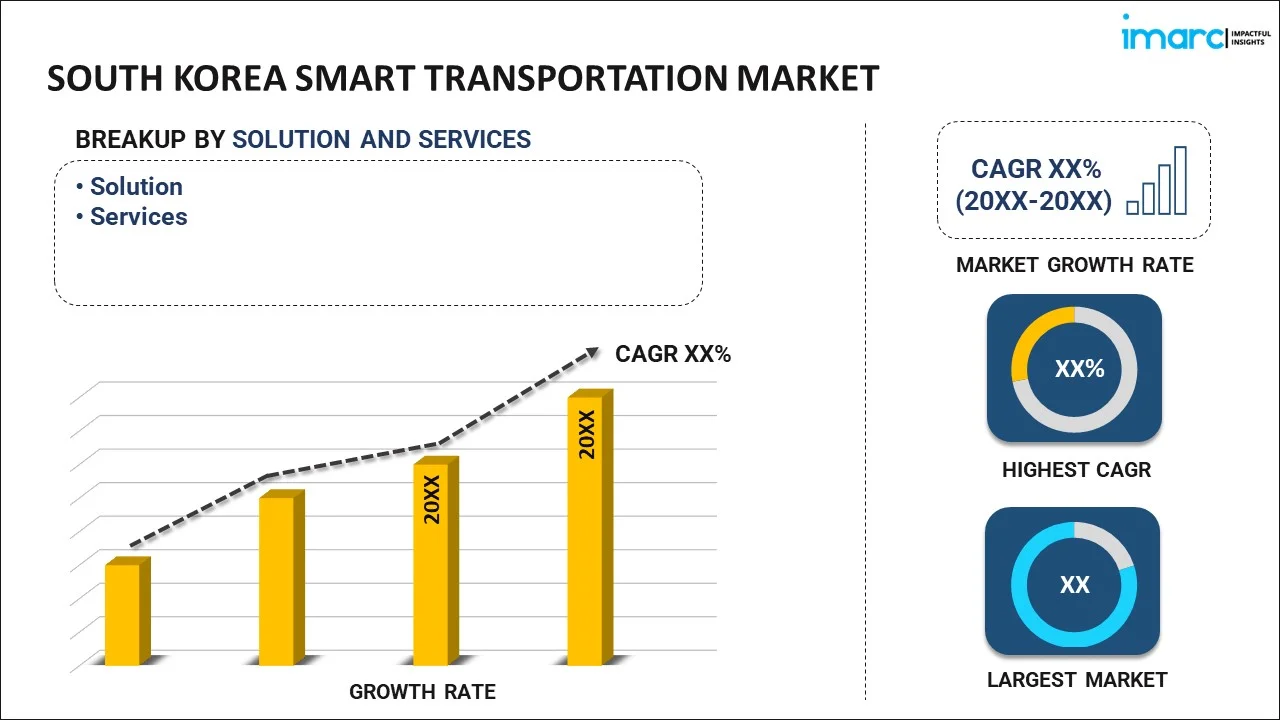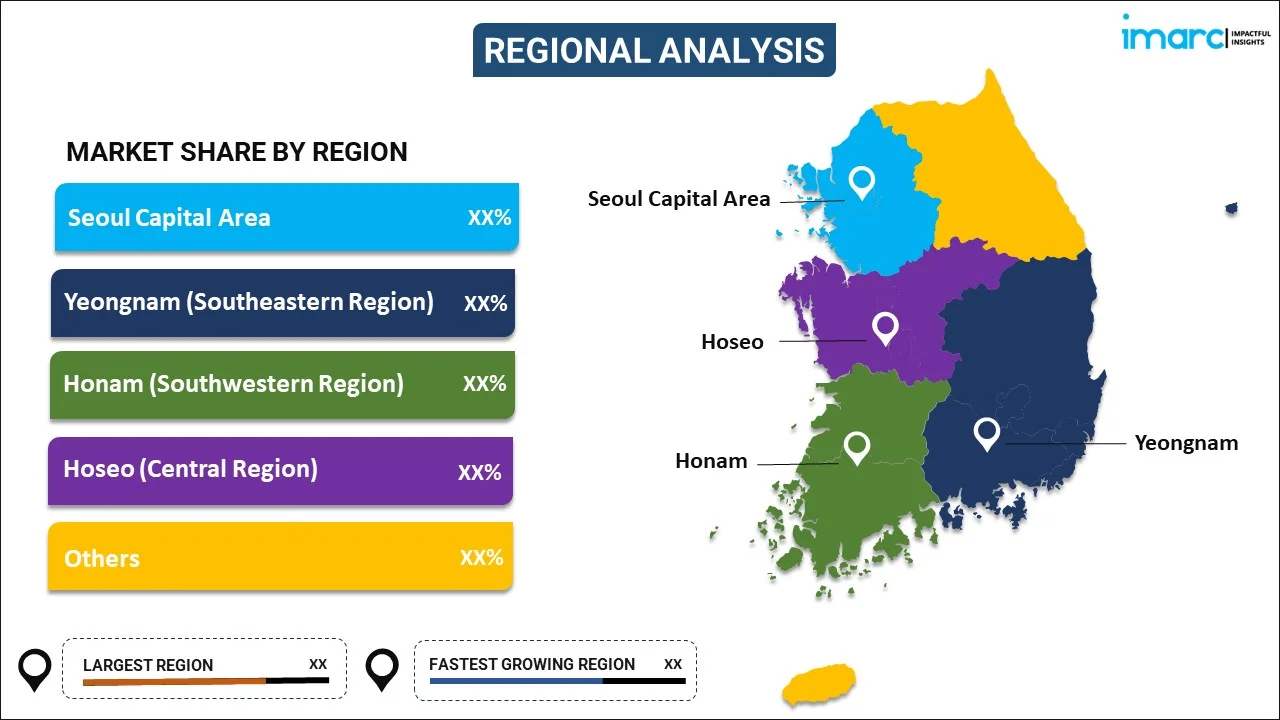
South Korea Smart Transportation Market Report by Solution and Services (Solution, Services), Transportation Mode (Roadways, Railways, Airways, Maritime), Application (Mobility as a Service, Public Transport, Transit Hubs, Connected Cars, Video Management, and Others), and Region 2025-2033
Market Overview:
South Korea smart transportation market size reached USD 2.3 Billion in 2024. Looking forward, IMARC Group expects the market to reach USD 5.3 Billion by 2033, exhibiting a growth rate (CAGR) of 8.90% during 2025-2033. The rising levels of traffic congestion and environmental concerns, which have created a demand for smart transportation solutions that can optimize traffic flow, reduce congestion, and minimize environmental impact, are driving the market.
|
Report Attribute
|
Key Statistics
|
|---|---|
|
Base Year
|
2024
|
|
Forecast Years
|
2025-2033
|
|
Historical Years
|
2019-2024
|
|
Market Size in 2024
|
USD 2.3 Billion |
|
Market Forecast in 2033
|
USD 5.3 Billion |
| Market Growth Rate 2025-2033 | 8.90% |
Smart transportation refers to the integration of advanced technologies and data-driven solutions to enhance the efficiency, safety, and sustainability of transportation systems. It encompasses a range of innovations, such as intelligent traffic management, connected vehicles, and real-time data analytics. Smart transportation leverages sensors, communication networks, and artificial intelligence to optimize traffic flow, reduce congestion, and enhance overall mobility. Examples include smart traffic lights that adapt to real-time traffic conditions, GPS-enabled navigation systems providing route optimization, and connected vehicles that communicate with each other to prevent accidents. By leveraging technology, smart transportation aims to create more accessible, reliable, and environmentally friendly modes of transportation, ultimately improving the overall quality of urban and interurban mobility. The goal is to create a seamless and integrated transportation ecosystem that responds dynamically to the needs of both individuals and the broader community.
South Korea Smart Transportation Market Trends:
The smart transportation market in South Korea is witnessing unprecedented growth, primarily driven by the escalating demand for advanced mobility solutions and the pressing need for sustainable transportation alternatives. Firstly, the increasing regional urbanization trend has spurred the demand for efficient transportation systems to alleviate traffic congestion and enhance overall urban mobility. Moreover, the rise of smart cities and the integration of Internet of Things (IoT) technologies have played a pivotal role in reshaping transportation landscapes. Connected vehicles and intelligent traffic management systems contribute to streamlined traffic flow and reduced carbon emissions. Furthermore, the growing emphasis on environmental sustainability acts as a significant driver for the smart transportation market. Governments in South Korea are implementing stringent regulations to curb pollution, prompting a shift towards electric and hybrid vehicles, as well as the adoption of intelligent transportation solutions that optimize routes for fuel efficiency. Additionally, the ongoing advancements in artificial intelligence and machine learning, which have enabled the development of predictive maintenance systems, thereby enhancing the reliability and safety of transportation networks, are expected to drive the smart transportation market in South Korea during the forecast period.
South Korea Smart Transportation Market Segmentation:
IMARC Group provides an analysis of the key trends in each segment of the market, along with forecasts at the country level for 2025-2033. Our report has categorized the market based on solution and services, transportation mode, and application.
Solution and Services Insights:

- Solution
- Hybrid Ticketing Management System
- Parking Management and Guidance System
- Integrated Supervision System
- Traffic Management System
- Others
- Services
- Business Services
- Professional Services
- Cloud Services
The report has provided a detailed breakup and analysis of the market based on the solution and services. This includes solution (hybrid ticketing management system, parking management and guidance system, integrated supervision system, integrated supervision, traffic management system, and others) and services (business services, professional services, and cloud services).
Transportation Mode Insights:
- Roadways
- Railways
- Airways
- Maritime
A detailed breakup and analysis of the market based on the transportation mode have also been provided in the report. This includes roadways, railways, airways, and maritime.
Application Insights:
- Mobility as a Service
- Public Transport
- Transit Hubs
- Connected Cars
- Video Management
- Others
The report has provided a detailed breakup and analysis of the market based on the application. This includes mobility as a service, public transport, transit hubs, connected cars, video management, and others.
Regional Insights:

- Seoul Capital Area
- Yeongnam (Southeastern Region)
- Honam (Southwestern Region)
- Hoseo (Central Region)
- Others
The report has also provided a comprehensive analysis of all the major regional markets, which include Seoul Capital Area, Yeongnam (Southeastern Region), Honam (Southwestern Region), Hoseo (Central Region), and Others.
Competitive Landscape:
The market research report has also provided a comprehensive analysis of the competitive landscape in the market. Competitive analysis such as market structure, key player positioning, top winning strategies, competitive dashboard, and company evaluation quadrant has been covered in the report. Also, detailed profiles of all major companies have been provided.
South Korea Smart Transportation Market Report Coverage:
| Report Features | Details |
|---|---|
| Base Year of the Analysis | 2024 |
| Historical Period | 2019-2024 |
| Forecast Period | 2025-2033 |
| Units | Billion USD |
| Scope of the Report | Exploration of Historical and Forecast Trends, Industry Catalysts and Challenges, Segment-Wise Historical and Predictive Market Assessment:
|
| Solution and Services Covered |
|
| Transportation Modes Covered | Roadways, Railways, Airways, Maritime |
| Applications Covered | Mobility as a Service, Public Transport, Transit Hubs, Connected Cars, Video Management, Others |
| Regions Covered | Seoul Capital Area, Yeongnam (Southeastern Region), Honam (Southwestern Region), Hoseo (Central Region), Others |
| Customization Scope | 10% Free Customization |
| Post-Sale Analyst Support | 10-12 Weeks |
| Delivery Format | PDF and Excel through Email (We can also provide the editable version of the report in PPT/Word format on special request) |
Key Questions Answered in This Report:
- How has the South Korea smart transportation market performed so far and how will it perform in the coming years?
- What has been the impact of COVID-19 on the South Korea smart transportation market?
- What is the breakup of the South Korea smart transportation market on the basis of solution and services?
- What is the breakup of the South Korea smart transportation market on the basis of transportation mode?
- What is the breakup of the South Korea smart transportation market on the basis of application?
- What are the various stages in the value chain of the South Korea smart transportation market?
- What are the key driving factors and challenges in the South Korea smart transportation?
- What is the structure of the South Korea smart transportation market and who are the key players?
- What is the degree of competition in the South Korea smart transportation market?
Key Benefits for Stakeholders:
- IMARC’s industry report offers a comprehensive quantitative analysis of various market segments, historical and current market trends, market forecasts, and dynamics of the South Korea smart transportation market from 2019-2033.
- The research report provides the latest information on the market drivers, challenges, and opportunities in the South Korea smart transportation market.
- Porter's five forces analysis assist stakeholders in assessing the impact of new entrants, competitive rivalry, supplier power, buyer power, and the threat of substitution. It helps stakeholders to analyze the level of competition within the South Korea smart transportation industry and its attractiveness.
- Competitive landscape allows stakeholders to understand their competitive environment and provides an insight into the current positions of key players in the market.
Need more help?
- Speak to our experienced analysts for insights on the current market scenarios.
- Include additional segments and countries to customize the report as per your requirement.
- Gain an unparalleled competitive advantage in your domain by understanding how to utilize the report and positively impacting your operations and revenue.
- For further assistance, please connect with our analysts.
 Request Customization
Request Customization
 Speak to an Analyst
Speak to an Analyst
 Request Brochure
Request Brochure
 Inquire Before Buying
Inquire Before Buying




.webp)




.webp)












